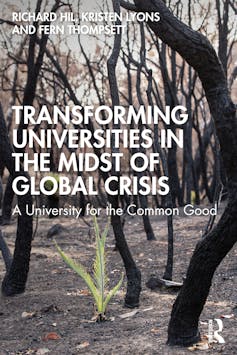Amid global crisis, how can universities be regenerated to serve the common good?
- Written by Kristen Lyons, Professor Environment and Development Sociology, The University of Queensland

Universities are among the many institutions that sustain settler colonialism in Australia. The public university system was, and continues, to be part of the state’s investment in its own future.
Universities emerged in Australia during the mid-19th and early 20th centuries against a backdrop of frontier violence and dispossession of First Nations’ lands, labour and relationships. While nature was privatised and commodified, universities grew in scale and influence. Knowledge hierarchies that perpetuate racial, class and gender divides were normalised.
Read more: Five shifts to decolonise ecological science – or any field of knowledge





